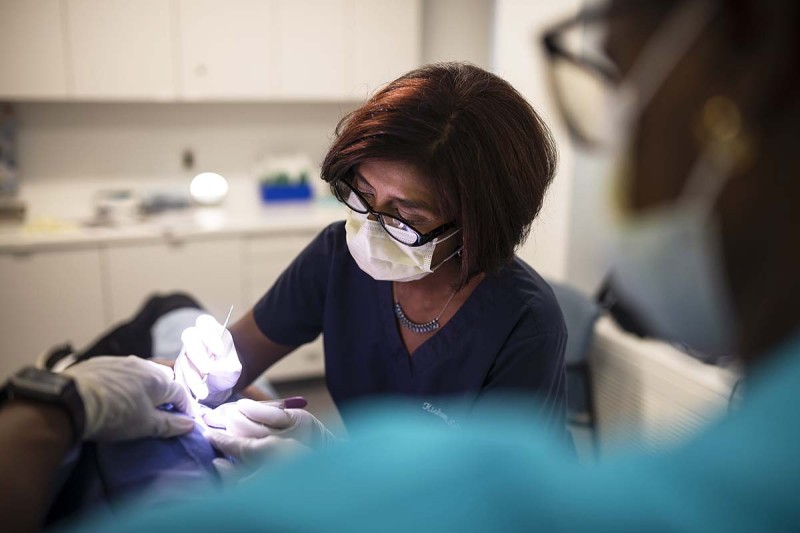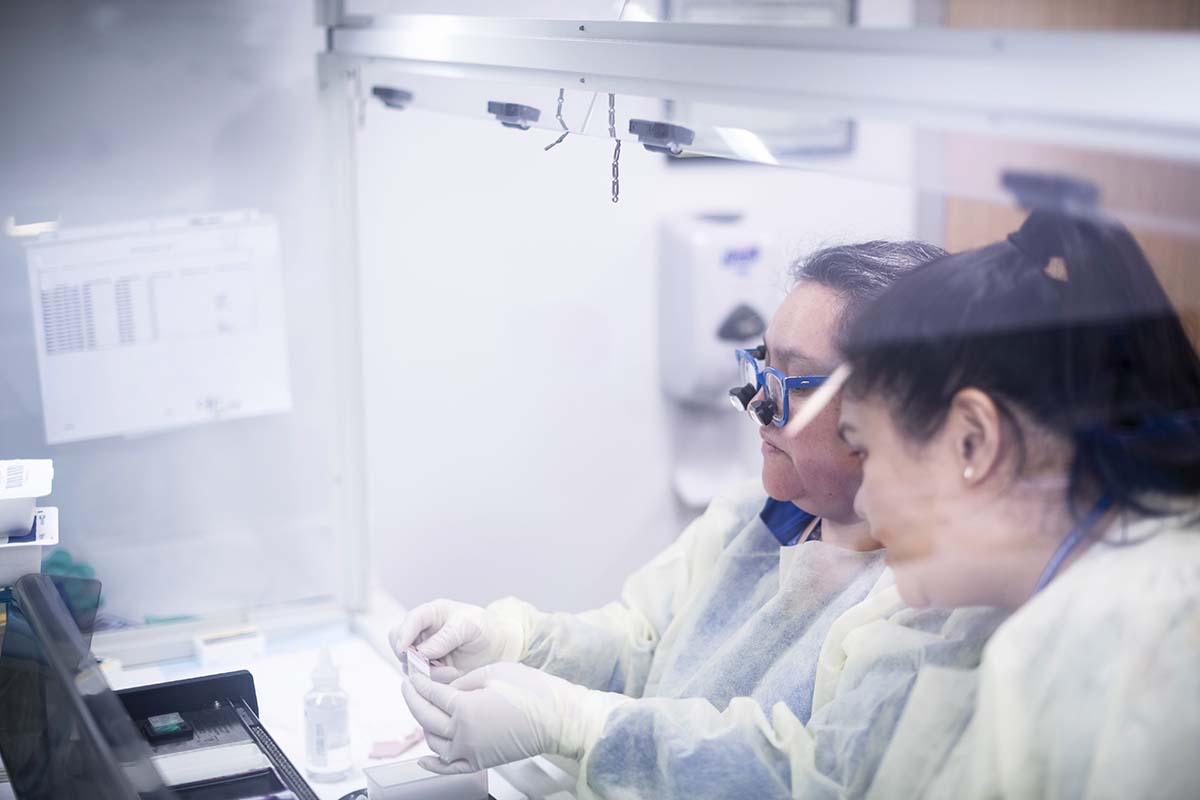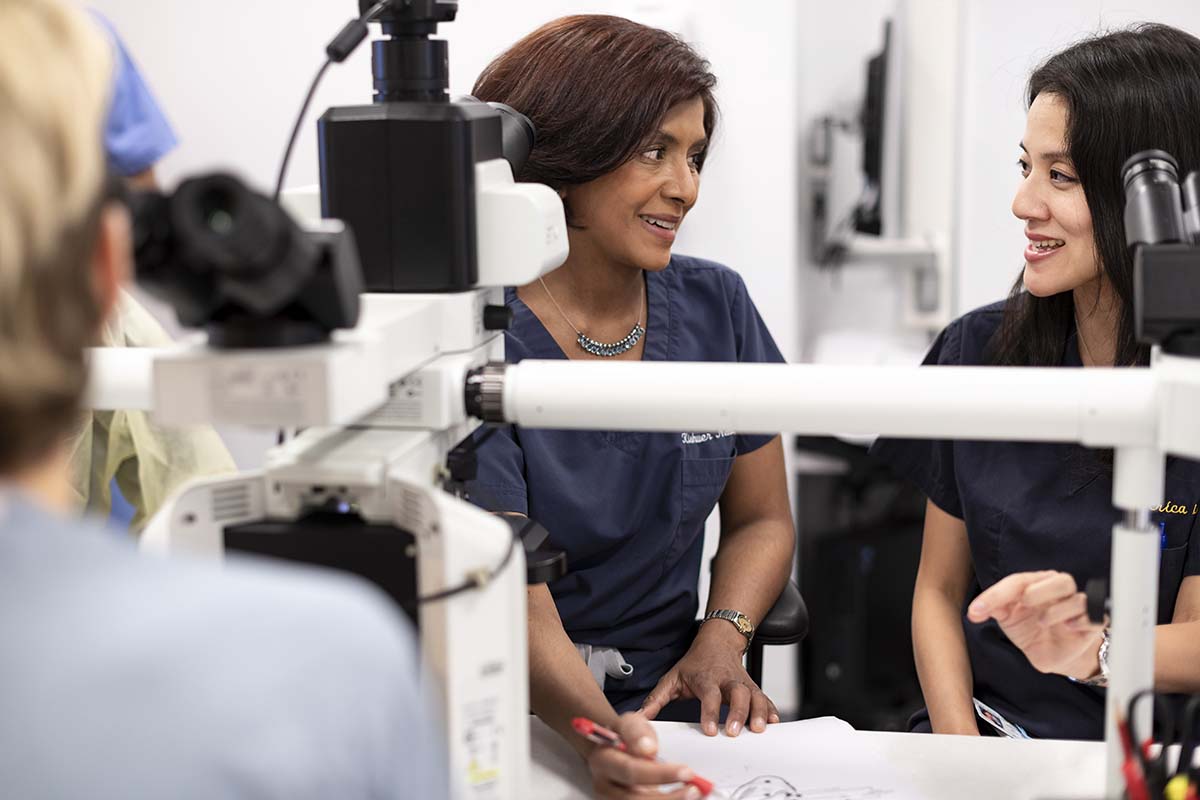
If you or a loved one has skin cancer that requires Mohs surgery or another dermatologic surgery, you’ve come to the right place. We want to help you understand your options and have the best outcome possible. This information is meant to guide you through your treatment. We want you to be prepared for the decisions that you and your doctors will make together.
Memorial Sloan Kettering is a leading center for Mohs surgery and other dermatologic procedures. Our highly trained dermatologic surgeons care for thousands of people with skin cancer each year. Our goal is to completely remove the cancer while giving you the best cosmetic outcome possible. We want you to have the best chance for a cure and to be satisfied with your care.
Our dermatologic surgeons are committed to helping you feel empowered and educated about all of your options. This includes nonsurgical therapies. We are nationally and internationally recognized for our expertise in caring for people with:
- basal cell carcinoma
- squamous cell carcinoma
- lentigo maligna melanoma
- early-stage melanoma
- complex skin cancer
- rare skin cancer
Mohs Surgery for Skin Cancer

Mohs micrographic surgery is a tissue-sparing procedure. It is used to remove certain forms of skin cancer.
The major advantage of Mohs surgery is that your doctor can take out the skin cancer precisely while removing the least amount of healthy skin.
Our dermatologic surgeons typically recommend Mohs surgery for squamous cell carcinomas or basal cell skin carcinomas that are:
- located in sensitive areas where it’s critical to preserve as much skin as possible, such as the face, scalp, hands, or genital area
- large in size
- growing quickly
Mohs surgery is the treatment of choice for people with basal cell or squamous cell skin cancer that has come back after prior treatment.
After the complete removal of the skin cancer, you and your care team will discuss the options for the fastest healing and best surgical scar. We take into account your preferences and lifestyle to select the right technique. We also work closely with MSK’s plastic and reconstructive surgeons when appropriate to ensure that you have the best possible cosmetic outcome.
Surgery for Lentigo Maligna Melanoma
Lentigo maligna melanoma (LMM) is a rare form of melanoma. It most frequently develops on the face and neck. Our dermatologic surgeons are among the most experienced in the world at treating this condition. We wrote the first and only book on how to manage the disease and are highly skilled in surgical approaches to remove it.
Noninvasive imaging called confocal microscopy maps out the skin that needs to be removed. Our team works closely with a pathology team focused on skin cancer. We make sure that you get the right diagnosis and that we put together the best possible treatment plan for you.
Surgery for Complex Skin Cancer
Some people with skin cancer may require specialists. That often happens when skin cancer has grown deeply or in a sensitive area of the body, such as the eye or near critical nerves.
The most effective way to treat advanced basal cell, squamous cell, and other unusual, aggressive skin cancers is to receive care at a comprehensive cancer center that focuses on treating the person as a whole and maintaining quality of life. That’s why we recommend that patients with these conditions consider receiving care from our Multidisciplinary Skin Cancer Management Program.
This program brings together experts in dermatology, Mohs surgery, head and neck surgery, surgical oncology, plastic and reconstructive surgery, medical oncology, pathology, radiation oncology, radiology, genetics, dentistry, nursing, and more.
Many of our patients are able to receive several expert consultations on a single day — and in one place — to make things more convenient and efficient.
Laser Therapy and Light Therapy for Skin Cancer
Advanced technology has great potential for enhancing the care of people with nonmelanoma skin cancer. Laser therapy and light therapy may provide effective noninvasive basal cell carcinoma treatment. At MSK, we have advanced expertise with all forms of laser and light therapy. This includes CO2 laser therapy, erbium laser therapy, and photodynamic therapy. We are also researching new noninvasive approaches to diagnose basal cell carcinoma and guide its treatment.
Scar Rejuvenation
Our dermatologic surgeons offer a variety of treatments to help a surgical scar look and feel better. Examples include:
- steroid injections
- dermabrasion (surgical scraping of the skin’s top layers)
- laser treatments
- surgery
These treatments can be done after enough time has passed for your scar to heal. Our team has extensive experience in performing all of these techniques. We will walk you through each of your options and work with you to decide if any of these treatments are right for you.
Patient Satisfaction
Our patients’ satisfaction is one of the most important aspects of the care we provide. That’s why our experts helped develop the FACE-Q Skin Cancer Module. This important tool helps us measure your satisfaction with your appearance and quality of life throughout your care. Our research shows that the use of FACE-Q Skin Cancer can help patients heal faster and feel better about the outcome of their care.
Follow-Up Care and Screening
We know that many of the people treated in our program remain at an increased risk for developing additional skin cancers. For that reason, screening and prevention are important aspects of our follow-up care.
We offer a special virtual program for people recovering from surgery to remove skin cancer. Led by a social worker, the group provides emotional support and guidance. Your care team can also help with the practical aspects of your recovery, including tips on caring for your skin after surgery and protecting yourself from the sun.
We’re developing new methods that allow us to detect cancer at the earliest possible stage. All patients receive guidelines from their care team so they know exactly when to get screened. We also offer 3-D total-body photography. This highly advanced computerized imaging can help people at a particularly high risk.
MSK’s Mohs and Dermatologic Surgeons






Why choose Memorial Sloan Kettering for dermatologic surgery?

Our experts provide leading-edge dermatologic surgeries for people with basal cell carcinoma, squamous cell carcinoma, early-stage melanoma, and rare forms of skin cancer. Our dermatologic surgeons have extensive experience in all types of procedures. These include Mohs surgery, laser therapy, and scar rejuvenation.
We are at the forefront of developing advanced noninvasive techniques. This includes confocal microscopy. These advances can map skin cancer to guide treatment. Such options give the thousands of people treated by our dermatologic surgeons each year the best possible outcomes.
Choose MSK for dermatologic surgery because we offer:
- Compassionate care from a team of experts. We have five dedicated dermatologic surgeons who are leaders in the field. These experts helped write the national guidelines on the treatment of basal cell, squamous cell, and other skin cancers. Our dermatologic surgeons work closely with other MSK specialists. This includes pathologists, head and neck surgeons, plastic surgeons, and a highly trained team of dermatologic nurses and technicians. Our collaborative approach helps our patients get the best results, before, during, and after skin cancer surgery.
- Convenient locations. Our dermatologic surgeons offer Mohs surgery and other dermatologic procedures at MSK’s locations in New York City and New Jersey, as well as on Long Island in New York. You may need to see more than one MSK specialist. If so, we coordinate your care so that you can have multiple appointments on the same day if it’s convenient for you.
- Unparalleled depth of experience. Memorial Sloan Kettering is home to a team of world-class dermatologic surgeons. Our experts help set the national standards of care. We provide education and training to dermatologists and other healthcare professionals worldwide. Our surgeons wrote the first book on lentigo maligna melanoma. We lead a multidisciplinary program for people with complex skin cancer and are leaders in sun protection and sunscreen advancements.
- Advanced technology. We are one of the few centers in the world to use confocal microscopy. This advanced technology helps map out skin cancer in exquisite detail. In many cases, this allows us to give more precise treatment. People who are at a high risk of melanoma can participate in our 3-D photography screening program. MSK is one of the only institutions in the world to offer this type of screening for people who are at a high risk due to personal or family history or because they have multiple abnormal moles.
- A powerful commitment to patient satisfaction. MSK wants to continuously improve outcomes and quality of life for people with skin cancer on the face. That’s why we developed the FACE-Q Skin Cancer Module. This tool measures our patients’ satisfaction with their facial appearance. Responses help us continually improve how we deliver care.
- Follow-up care. MSK’s quality-of-life specialists are here to help you recover. Comprehensive care is offered at our 64th Street location in Manhattan. In addition, many services are available at MSK’s locations in Basking Ridge, New Jersey, and in New York in Westchester County and on Long Island. We offer an online support group to help you care for your skin, manage anxiety, and address other concerns you may have after surgery.
We’re available 24 hours a day, 7 days a week

